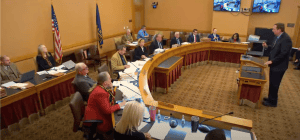An economist at the Tax Foundation told the Kansas Senate Taxation committee states can lose competitive edge if they don’t tweak tax policy related to the ‘Trump Windfall.’
“Sometimes standing still means you’re falling behind,” Nicole Kaeding, the director of federal projects at the Tax Foundation, told the Kansas Senate Committee on Assessment and Taxation.
In a wide-ranging tax policy discussion, Kaeding shared with committee members how other states are dealing with the Trump windfall and potential pro-growth tax policy changes to keep Kansas competitive with other states.
Her presentation was part of a continuing discussion on possibly modifying the state’s tax code to protect taxpayers from changes in the federal tax code. The Kansas Department of Revenue estimated last year that the state could collect as much as $100 million more from taxpayers as a result.

The American Tax Cut and Jobs Act nearly doubled the standard income tax deduction for individuals. Currently, Kansas’s standard deduction is significantly lower — about $7,000 per married couple compared to a $24,000 deduction for a married couple after federal tax reform. Traditionally, Kansans who itemized on the federal form were able to itemize automatically on the state form, and those who used the standard deduction could use it on both forms.
“Some states have moved to expand their standard deduction,” Kaeding said. “Ideally, you would just conform to the federal statute.” Alternatively, Kansas could allow taxpayers to itemize for state purposes even if they took the federal standard deduction.
Kaeding also said lawmakers should examine how they’ll adjust the corporate tax code in response to federal reforms. The American Tax Cut and Jobs Act will likely create a one-time windfall based on the removal of a disincentive for overseas companies to bring profits back into the U.S. While most states never taxed repatriated income, Kansas is one of 14 states who do. The Sunflower State will likely see some revenue gains as corporations use that one-time tax perk to bring money back to the country, but Kaeding cautioned lawmakers to spend it wisely if they choose to tax it. Most states aren’t taxing it, but others, like Oregon, are taxing it and using the proceeds to make a one-time payment to the state’s pension fund.
“Realize it’s one time money and spend it correctly,” she said. “Don’t build it into your baseline budget.”
Kansas’s overall tax structure is the 28th best of the 50 states, Kaeding told the committee.
“Not great. Not horrible,” she said.
Kansas has the 34th best corporate income tax rates, the 21st most competitive individual income tax rates, and the eighth highest combined state and local sales tax rates. Kansas exempts several services, like legal and tax preparation services, from collecting sales taxes. Though service taxes weren’t the focus of the discussion, committee members seemed interested in examining sales tax exemptions for services in the future.
Sen. Caryn Tyson, chair of the Senate Assessment and Taxation Committee, called Kansas’s service sales tax policy “scattered.”
“You pay sales tax on dry cleaning. You pay sales tax if you go and have your food processed. A lot of other services are not taxed,” she said.
All states tax some services, but no state taxes all services; that may change in the years ahead, Kaeding told the committee.
“Ideally, a state sales tax base should tax all final consumption, or all goods and services,” she said.
She noted that several states are looking at taxing more services, and she expects more states will do so in the future.
“It can actually be a way to make your sales tax more progressive, particularly if you use that additional revenue that’s generated to buy down that sales tax rate,” she said. “…The individuals that buy those types of services tend to be higher income. The individuals who hire someone to mow their lawns probably have more disposable income than someone who is struggling to make ends meet,” she said.



